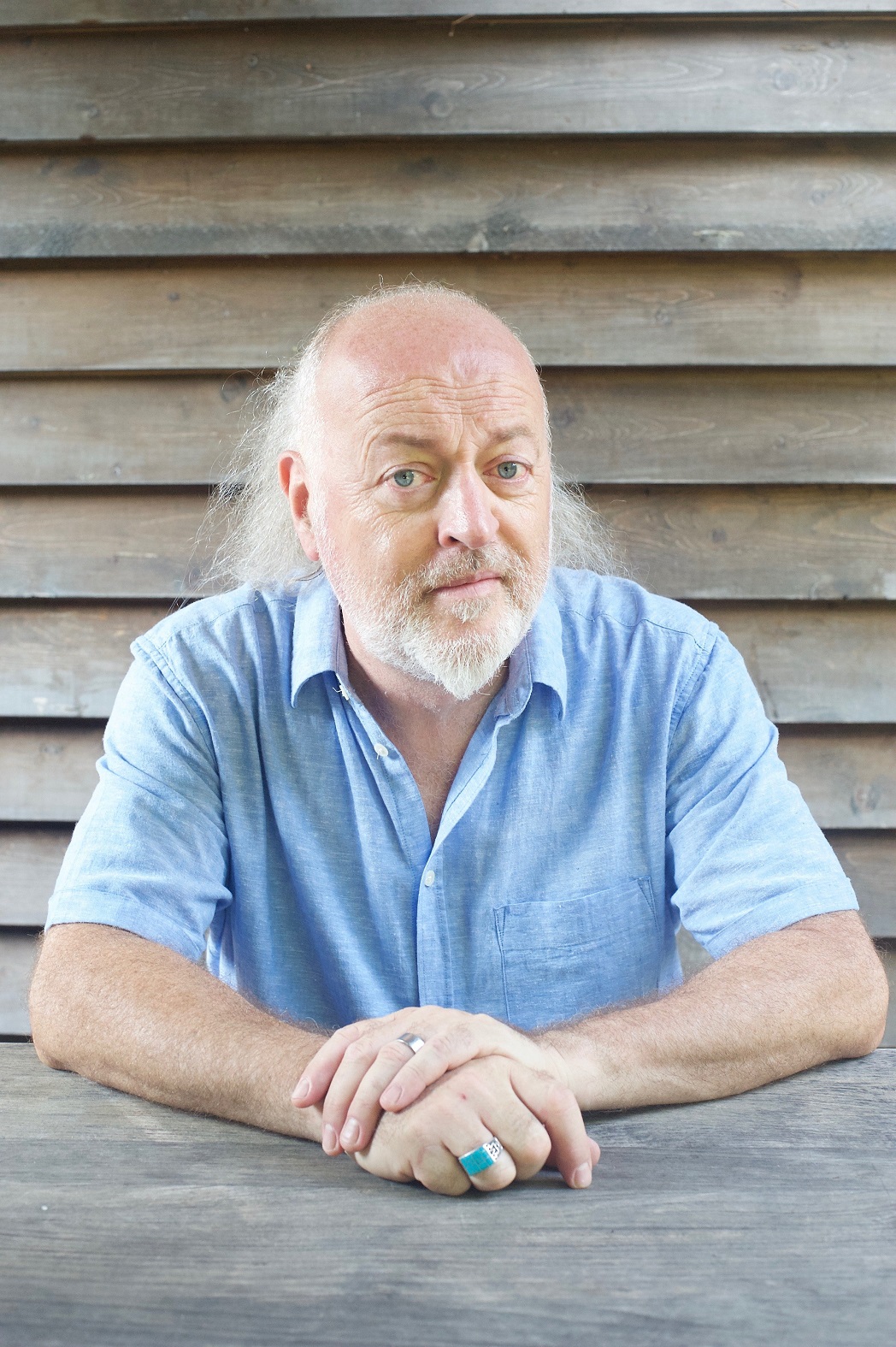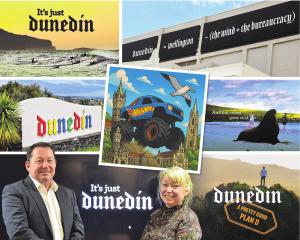
Bill Bailey answers the phone and immediately whisks the listener off into the whimsical world of English humour.
"We’ve travelled up into deepest Wales," he says, apparently adopting the marmalade sandwich-packing persona of Paddington Bear (darkest Peru). "For a wedding."
He’s relaying these geographical specifics - central Wales, he says - in order to more fully communicate a precarious circumstance.
"I am literally in a 10-yard square area of mobile phone service," he explains. "It’s a little patchy, shall we say, around here."
Beloved Brit comedian stands alone in remote rural Wales - with or without sheep - possibly in the dark. It’s 11.30pm his time and he’s scared to move. There’s a whiff of Withnail and I about it, the eccentricity dial spinning clockwise, heading for 11, courtesy of a former Empire’s threadbare infrastructure.
And there is every reason to expect the gentle, wide-eyed eccentricity of the man from Bath with the fly-away mullet will be very much present during his return to these shores next month.
After all, Bailey toured Aotearoa a few years back with a show called "Earl of Whimsy".
Except that was then and this is now and we’ve had Covid-19 since, the virus infecting humans and politics in equal measure. On top of which, we’ve emerged blinking out of isolation only to be confronted by AI, threatening to make the world even less safe for humankind.
With that in mind, Bailey’s new tour has taken a darker turn - at least by his own standards.
It’s called Thoughtifier.
"I love to come up with these words, new words for shows," he says, perhaps helping to explain how he came to be voted the seventh most intelligent person on TV in Britain, a few years back.
At the time he said he was happy enough to settle for seventh, given seven was good enough for Snow White. "No-one really remembers who number eight is."
"Thoughtifier" occurred to him as a way of combining the two things that are features of his shows, he says from his small patch of Cymru.
"Which is odd thoughts, thought experiments, rabbit holes, stories, anecdotes, rambling routines and the word ‘amplifier’, which features of course a lot in all my music. So it is a sort of portmanteau word, if you will."
Using words like "portmanteau" probably helped with that seventh placing too, alongside phrases such as "if you will".
"Then I thought, I quite like the idea of a thoughtifier, something which amplifies thoughts, which is I guess, in a way, what stand-up is.
"That is very much on my mind in this show, which is about the idea of human thought and the history of it and also the idea of human consciousness and humanity in all its glory, its flawed brilliance. Because, there is a general low-level panic about the onset of AI and how that might affect our lives and how it might take over the world and render it all redundant and then we’re all shambling around in some kind of pre-industrial state eating tinned pineapple with a fork."
It’s not clear whether Bailey thinks the AI will have supplied the tinned pineapple and the fork, or if it’s an assessment of what we might retrieve from the wreckage.
But the good news, particularly for those who don’t like pineapple, is that Bailey is on the side of those who regard the AI armageddon as a little overegged.
"Actually, my thought is that we don’t have to worry too much because humans are so cussedly odd and strange we would be very difficult to replace."
It sounds very much like Bailey will be deploying a little quod erat demonstrandum with his show in the service of that argument.
If not with his patter then certainly with his music, which regularly defies good sense and good taste. On the "Whimsy" tour the classically trained musician closed out proceedings with an encore of Stairway to Heaven played on musical bells. His gigs also regularly feature a theremin - an instrument which, if not already a thing, might have been invented by AI - which he plays.
"I have got back to playing a lot more music, singing with opera singers, singing with sea shantymen," Bailey warns from Wales, confident that this will be regarded as a good thing.
Traditional singing, he clarifies, has been inspiring him in the last couple of years.
"What I am hoping to do is something that started in the UK, with a friend of mine who is an opera singer. I got asked to perform at the Royal Opera House at Covent Garden, so I thought it was only right, it would be rude not to play some opera, so I invited her to come and sing some opera and I wrote a little mini operetta, wrote a madrigal and then we performed Carmen, but I added my own subtitles because of course people’s French is maybe not quite up to speed. So that’s exactly what I’ll be doing in New Zealand and hopefully we will have some local opera, some homegrown opera singers who will be joining me on the tour."
Of course it can’t be any old madrigal. Sometimes you have a musical idea, he says, which in this case was prompted by reading about the first meeting of Henry VIII and Anne of Cleeves in 1539, which didn’t go well. Henry, past his best and in fancy dress, tried to kiss the unsuspecting Anne, who exhibited good Teutonic common sense by rebuffing him.
"It was a disaster, so I thought that would be a funny thing to write a madrigal about," he says.
From there, things get a little unlikely.
He has an idea for modern day sea shanties, or land shanties, he says, the latter better suited to a world without fleets of sailing ships.
"Shanties are all about the practicalities of hauling up a sail. I said, ‘we don’t have songs the purpose of which is to replicate a physical act, so what do we do these days? Well, we just kind of scroll through our phones. So, I have a scrolling shanty."
The mystery of music is endlessly fascinating, he says, the fact that it is purely for our pleasure and enjoyment, its ability to evoke emotion.
"Why is it part of the human experience? Is it something that other animals, other creatures feel? We know that whales have sometimes quite complex songs. Do they have favourites? Do they ever get together in a sing song? What about other animals, animals that we consider perhaps less intelligent and less complex, like crustaceans and crabs. Do crabs sing? Do crabs have songs? Do they have memories? Do they have regrets? These are the kinds of things I love to explore."
Here we are, he says, the dominant species on the planet, humming away at this activity that doesn’t appear to provide any particular evolutionary advantage, but blithely and recklessly carrying on because it makes us feel good.
"AI wouldn’t be able to cope with that," he says, circling back around to his theme. "AI is just really a sort of pot pouri, it is the sweepings of human thought all put into a melange and thrown back at us."
And have a listen to AI’s early attempts at creativity, he says. "Uninspiring."
"Quite terrifyingly awful sometimes, so I think we are safe. I think that human thought and creativity is safe for now."
Bailey fills stadiums these days, selling many more live tickets than AI just yet. Thoughtifier will tour the UK early next year tracking around a long list of arenas before winding up at London’s capacious O2. Many of those in the covered seating will be fans from way back, or at least since his breakout appearance in Black Books. Others will have come on board since Bailey vaulted to even greater Blighty notoriety by taking out the ballroom competition show Strictly Come Dancing a couple of years back. He was then the show's oldest winner at 55.
It’s a long way from his ’80s visit to an alternative comedy show at a London anarchist vegetarian commune, which set him on his current path - along which he has several times earned mentions in lists of top comics.
"I went along and I thought, ‘this is the sort of thing I want to do’," he recalls.
"I saw people going up and playing songs and coming up with daft ideas. Some of it was poetry, some of it was just observational stuff, some of it was quite thought provoking and some of it was just plain daft and I just thought, I am gravitating towards this."
An element of that anarchic mix has stayed with him, he says. Certainly, the novelty of what he does has never worn off.
"And I am always aware that I am in a very fortunate position to be able to do this and basically have fun and entertain at the same time, they are two things that I never really underestimate the value of, those two things, and I still delight in it."
Bailey will tour New Zealand as another example of the great British export that is its comedy. Indeed, his recent appearances in New Zealand bookend tours by his Black Books partner, Dylan Moran. He’s happy to see himself as part of that tradition.
"I mean, perhaps we are diminished as a global imperial power, but I think we are still punching above our weight in terms of humour," he says.
"It is sort of soft power, if you will."
And it turns out, Bailey’s part in all this may have been written in the stars, or at least the software - but certainly not AI.
"When I was at school I went and did one of these career advice computer printout things," he says. "You put a load of information into them and it spits out a couple of careers. And I was intrigued that mine was museum curator or member of the diplomatic service, and I thought, ‘what?’. You know? Now of course I am in a position where I like to hold up curios to the world for entertainment, which is I guess is a sort of role of museums. And member of the diplomatic service? Well, maybe not, but I tend to travel around the world mocking and celebrating Britishness in equal measure. So, perhaps it was way ahead of its time."
From where Bailey stands - not in deepest Wales, but as a now celebrated fixture of the British comedy scene - British comedy looks to be in good health.
"Recently, I persuaded Channel 4 to set up a comedy bursary in memory of my friend Sean Lock, who died in 2021, and a few weeks ago the very first inaugural Sean Lock Comedy Award took place in London and I was there to see it and to judge. There were 10 comics, young comics, pretty new, pretty raw and they were whittled down from many comics from all around the country, comedy clubs throughout the whole of Britain. And they were all great, interesting and funny and quirky, they all had something to say or were just naturally funny, and I thought ‘yeah, this is good, we’re in good shape’. So, I think we’ll be all right. I don’t think any comedy algorithm is going to take over. Not just yet anyway."
If Bailey were to offer any advice to these young joke tellers, it might be something along the lines of some wise words he was offered once himself.
It was from another stand-up he worked with when he was starting out, called Bob Mills.
It was pretty basic, but it has stayed with Bailey: to keep saying funny things.
"It is one of those daft things. This is daft, that’s obvious. You know? Tell me something I don’t know. But, then, actually, a bit like the careers advice it has a sort of longevity, this thing. It gets under your skin a bit. Because my comedy can be sometimes quite intellectual or a bit obscure or it feels like I have this urge to educate as well, so it can veer into something which is almost like a Ted Talk or something. And when that happens, I just remember, no, just keep saying the funny things.
"Yes, you can be interesting and it can be informative, but funny, that’s the main thing."
The show
Bill Bailey: Thoughtifier
Dunedin Town Hall
Tuesday, November 7












